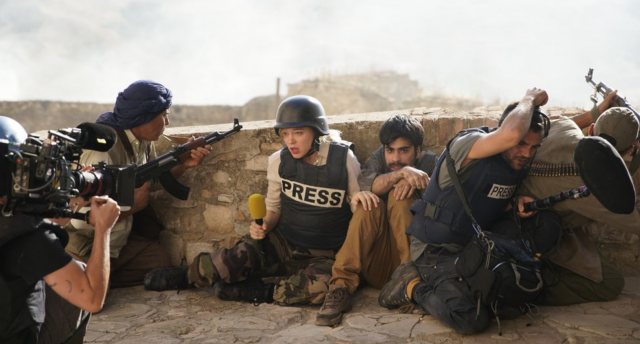France: Le Vide, by David Bax

In Bruno Dumont’s France, France (both the title character and the country in which the film is primarily set) is always gorgeously well-appointed. France (Léa Seydoux) traverses modernist homes, luxurious resorts and state-of-the-art television studios. Similarly, she is always done up and dressed to the nines with her hair and make-up camera ready. She’s a television journalist and even her in-the-field outfit of bulletproof vest and helmet seems to have been assembled more out of concern for aesthetics than for safety.
There’s so much that you can learn about France just by looking at her. Even her conversations with her friend and producer Lou (Blanche Gardin) are largely nonverbal; hand signals and facial expressions abound in the shorthand of their friendship. When displeased, France relies on an exasperated puffing out of air from her mouth to relay her frustration. Her command of her own face and the different types of armor represented by her clothing choices add up to a portrait of strength and self-assurance. And so it never stops being shocking when that face crumbles into tears, as it does at multiple points throughout the movie. It takes a meticulously tuned actor to get this mix of toughness and vulnerability right without the pathos being telegraphed. Seydoux has always been great but this just may be the best performance of her career so far.
All of this is not to imply that France would work without its dialogue. On the contrary, it is an extremely talky movie. As in a Whit Stillman film, though, the characters are less defined by what they say than by what they’re attempting to avoid by being so loquacious. Often, conversations in France are one-sided, because they’re played for the news camera’s benefit or because the other participant is not really listening or because, as hilariously happens on multiple occasions, someone’s on the phone using a wireless earbud that we can’t see, giving the initial impression of a person standing around, literally talking to themselves.
Like a lot of things in France, that’s intentionally funny. The movie ought most accurately to be described as comic melodrama but it also employs an overtly satirical form of comedy. This is most common in the scenes depicting television journalism, a phrase Dumont suggests is a contradiction in terms. When France is in the field, interviewing freedom fighters and refugees, she’s more producer than reporter, staging shots and giving her subjects dialogue.
It’s patronizing for this rich, white woman to pretend to care about the plight of poor people of color living under constant mortal threats as long as it’s on her terms. But it’s a knowing patronization. Less so, perhaps, is France’s response to the movie’s Code Unknown-recalling major inciting incident, when she strikes a young man on a moped with her car after dropping her son off at his fancy private school. With a dislocated knee, the sole household earner for his out of work immigrant parents is laid up. France first attempts to dissuade her guilt by giving the family tens of thousands of dollars and a new moped. Then she quits her job and retreats to a ritzy mountain sanitarium. In short, she has a breakdown.
Where France’s story goes from there is as much a surprise to us as it is to her. Dumont often lets shots linger after they’ve reached their expected termination points, as if waiting to see what else will happen, the same thing that happens in France’s news reports. France is a movie that argues in favor of giving things room to play out but it also warns that more space does not necessarily equal more comfort.



























